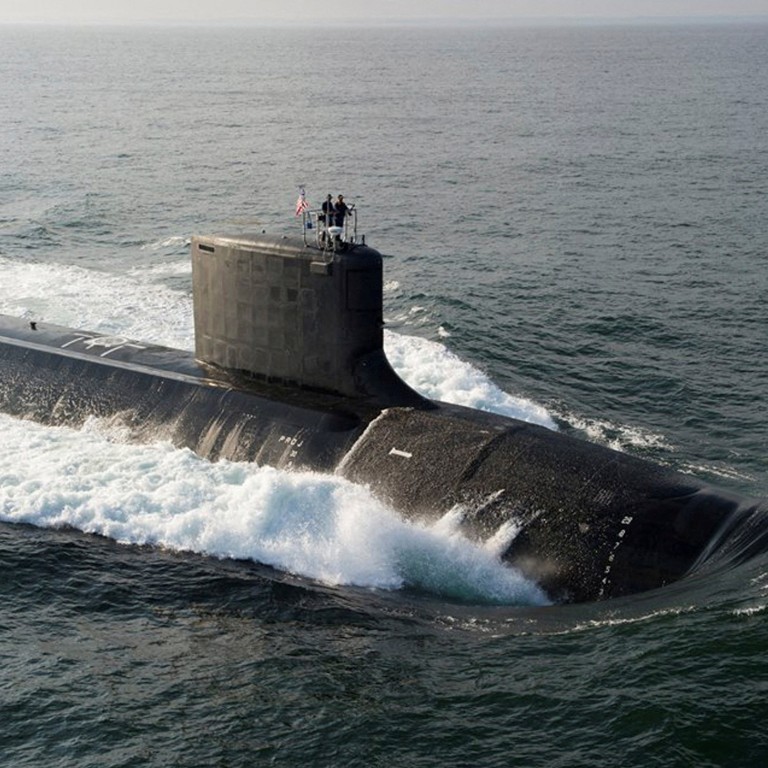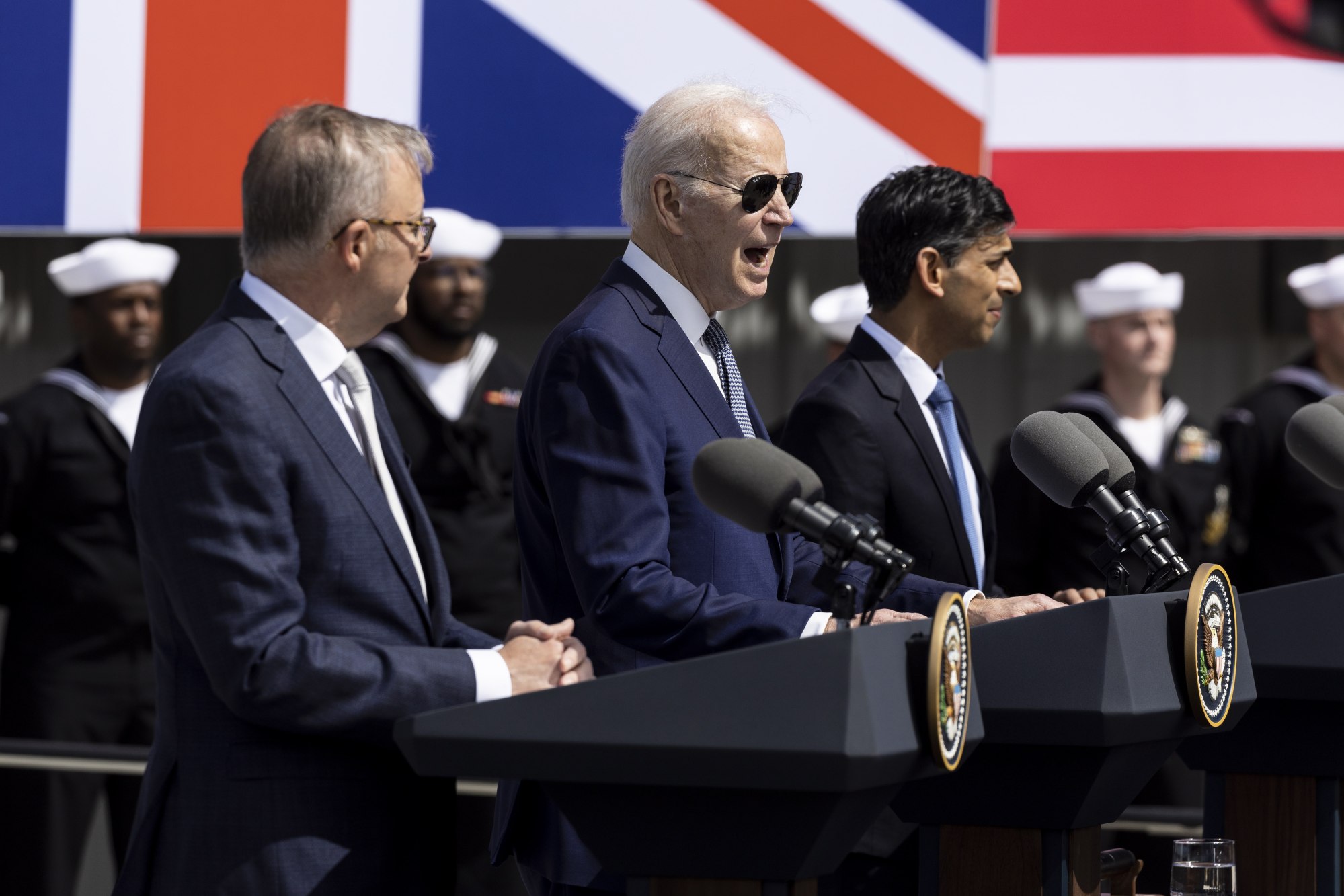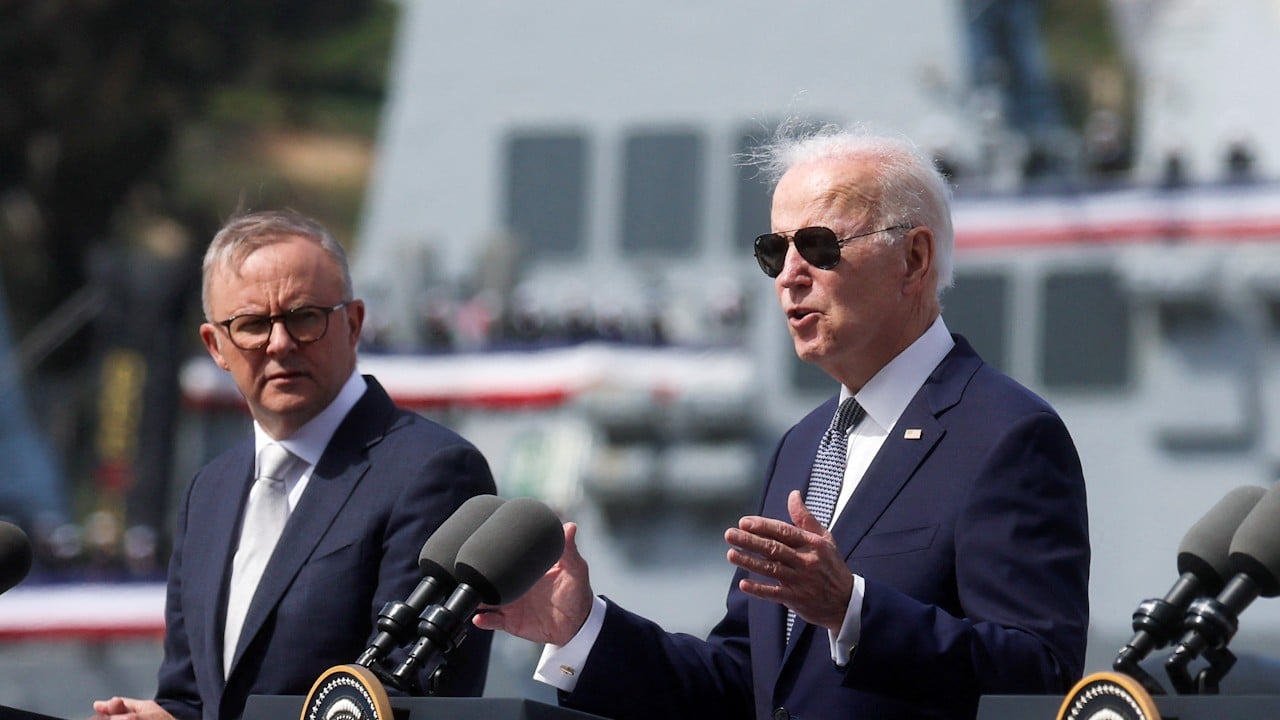
Aukus upends Australia’s US-China balancing act as Canberra cements ‘its American course’
- Analysts and former diplomats say the pact is set to deepen Australia’s alignment with Washington as it reverts ‘to a mindset from the past’
- Some see a clear choice in Canberra aligning itself with ‘the US and the Anglosphere’ – or is it all about the ‘shared purpose’ of maintaining peace?

Not helping matters was a warmongering series of alarmist articles sounding “Red Alert” about a looming Chinese military invasion that ran in the Australian press this week, which critics blasted as a piece of heavy-handed political theatre staged to win support for future defence budget increases and the alliance with the US, while distracting the public from domestic concerns like the rising cost of living.
Indeed, many experts who spoke to This Week in Asia said that Aukus had reinforced Australia’s historical preference for alignment with the US and former colonial master Britain.
“Aukus will define Australia’s regional and international personality. No amount of finely crafted rhetoric can hide this,” he said. “I think Australia definitely chose its American course some time ago, but for many in the national security community in Canberra, the Aukus announcement will provide the ultimate symbolic closure to any idea that Australia ever had a ‘choice’.”
‘A mindset from the past’
“Australia had been retreating from Asia for more than a decade,” said Jocelyn Chey, a former Australian diplomat who worked in China, adding that Canberra’s decision-making had long been primarily informed by Washington’s views.
“The Aukus deal has finally confirmed that it does not see itself primarily as a member or partner of the Indo-Pacific region, let alone the Asia-Pacific, a term which is no longer current in Canberra,” she said.
Alison Broinowski, president of Australians for War Powers Reform and also a former diplomat who held postings across the region, said the country had made another “Western move”.
“I regret that after taking a close interest in the Asia-Pacific region and making some positive contributions, Australia has reverted to a mindset from the past,” she said.
Asian-Australians fear ‘Red Alert’ warmongering will fuel rise in racist hate
Membership of the US-led Quad will also continue to hurt Canberra’s China ties, said Geoff Raby, a former Australian ambassador to Beijing.
“It is an alliance directed at containing China and involves two countries with which China has ongoing border disputes, Japan and India,” Raby said.
“I see an Australia that has reaffirmed its primary interests and affiliations are primarily with the US and the Anglosphere.”

Geopolitical analysts in Southeast Asia and the Pacific say the official unveiling last week of a timetable for Australia to acquire nuclear-powered submarines may have stymied its attempt to straddle both sides of the US-China contest.
“Aukus is seen as the latest in a series of moves and countermoves of major power rivalry in this region literally on our doorstep,” he said.
There are questions on how the Anglo-centric nature of Aukus would reflect on Australia’s identity in the Asia-Pacific
“There are questions on how the Anglo-centric nature of Aukus would reflect on Australia’s identity in the Asia-Pacific. This explains the undertones of statements by Malaysia and Indonesia, and perhaps the circumspection of other Asean member states.”
Both countries issued similar statements this week when details of the pact were revealed, reiterating in what analysts called a mild tone the importance of Aukus complying with their non-nuclear policies and wider agreements on nuclear non-proliferation, as well as avoiding provocations.
US and Australia deepen defence ties, vow to check ‘dangerous’ China
“I think Australia is very tight with the US with a strength of relationship comparable to the US and Nato, or the US and Israel,” he said.
Maintaining peace?
Former ambassador Jose L. Cuisia Jnr told This Week in Asia that Manila was very concerned about being taken advantage of by China.
“We in the Philippines will do everything to avoid war, but at the same time we are concerned that China is pushing us further and further away from our territory,” Cuisia said during an interview at the Wharton Global Forum in Singapore last week.
“For example, our fishermen have lost their livelihoods, while the Chinese fishermen have been fishing in our waters, and the irony is we are buying fish from China that were caught in our territory.”

He acknowledged that a confrontation would do no good and crucially, said the Philippines would be “wiped out” if it had to fight China.
This is why Aukus is important, said Tom Switzer, executive director of the Centre for Independent Studies in Australia, because like the Quad it is designed to ensure “safe and secure sea lanes and air space in international waters.”
“The objective of Australia’s beefed-up defence posture is not to provoke China, but to send a message to Beijing that many states in the region will try to check any aggressive ambitions on China’s part,” he said.
Australia and the US have a “shared purpose” of maintaining peace in the region and Canberra is trying to support this, said Ahmad Rizky Umar, an expert on Asian regionalism at the University of Queensland.
I’m not sure Asean has a capacity to act as arbiter between Aukus countries and China
Simon Tay, chairman of the Singapore Institute of International Affairs, said that the “statements and diplomacy” surrounding Aukus were more important than any perceived shifts in alignment as Australia has been aligned with the US on defence matters since the second world war.
“Some of it is too blatantly anti-China, rather than simply about peace and stability for Australia. Penny Wong belatedly seems to give emphasis to the latter but things said are hard to take back,” he said.
Separately, some have argued for Asean to take on a bigger role in policing Aukus activities, but few observers think the bloc would be willing or able to do that.
“Asean consists of some major economic and political actors such as Indonesia … [but] I’m not sure Asean has a capacity to act as arbiter between Aukus countries and China,” said Muhammad Zulfikar Rakhmat, an assistant professor at Universitas Islam Indonesia.
Still, Asean should consider establishing a “regional institution” while enacting a code of conduct that would keep Aukus activity in check, said Baogang He, an international relations expert at Deakin University.
The view from China
Nevertheless, US-led military moves such as Aukus will deepen China’s resolve to get tougher in the region, said Zhang Mingliang, specialist in South China Sea studies at Jinan University in Guangzhou.
China’s foreign ministry said this week that Aukus countries had “gone further down the wrong and dangerous path for their own geopolitical self-interest, completely ignoring the concerns of the international community” with the latest announcement on submarines.
Canberra rebutted by saying the deal was about maintaining “a stable, peaceful and prosperous region”, while Albanese disputed it would undermine the two countries’ recovering ties.
Meanwhile, there are those who say Beijing is not overly concerned with whom Australia aligns itself with, so long as it does not undermine China’s interests.
Australia’s Aukus deal harks back to colonial vision of Asia-Pacific
Chen Hong, director of the Australian Studies Centre at East China Normal University in Shanghai, said China was more occupied with its own defence capabilities and development schedule, which is “not affected by the melodramatic fanfare of Aukus”.
He said Beijing could accept Canberra moving closer to Washington but wanted to see “political wisdom” in Australia’s handling of relations with the world’s two biggest economies.
“Australia has every right to form partnerships or alliances with other countries, but such groupings should not target to threaten China’s national interests,” Chen added.


